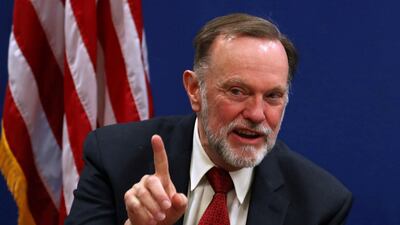The United States no longer has an adversarial relationship with the Sudanese government and sees it as a partner, assistant secretary for African affairs at the State Department said on Friday.
However, Tibor Nagy cautioned that removing Sudan from a list of state sponsors of terrorism was a process with conditions.
"It's not an event, it's not flipping a light switch. It's a process and we are heavily, continuously engaged with our Sudanese interlocutors on how we can go about doing that," he told reporters in a briefing.
Asked if the United States was committing to lifting sanctions, Mr Nagy said "No" but added: "There are conditions to such an event.
"Everybody is hoping that it will happen, everybody is hoping that it happens as quickly as possible, we all understand the hardships that it is causing."
The US government added Sudan to its list of state sponsors of terrorism in 1993 over allegations that then-President Omar Al Bashir's Islamist government was supporting terrorist groups.
The designation makes Sudan technically ineligible for debt relief and financing from the IMF and World Bank. Congress needs to approve a removal.
Months of demonstrations over price hikes for fuel and bread and cash shortages led to an uprising against Bashir, who was toppled by the military in April.
A civilian transitional government was formed in August and it agreed with the United States that it could start engaging with international institutions while still on a list of countries deemed sponsors of terrorism.
Supporters of the ousted Sudanese leader Al Bashir held a protest on Saturday vowing to oppose any move by the country's new authorities to hand him over to the International Criminal Court.
Dozens of his supporters, carrying Bashir's portrait, gathered outside the Khartoum court where he is being tried on charges of illegally acquiring and using foreign funds.
"We are with you. We will never betray you. No, no to ICC," chanted the crowd as the former president was brought to the courthouse for a hearing.
The demonstration comes amid growing calls from human rights groups, activists and victims of Sudan's Darfur war for the surrender of Bashir to The Hague-based court.
"President Bashir represents the whole of Sudan. We have an independent judiciary and if any trials are to be held, they must be held here," said protester Mohamed Ali Daklai.
"We reject any outside or foreign tribunal. ICC is anyway a political court used by Western countries to pressure the weak."
Bashir was ousted by the army on April 11 following nationwide protests against his iron-fisted rule of three decades.


